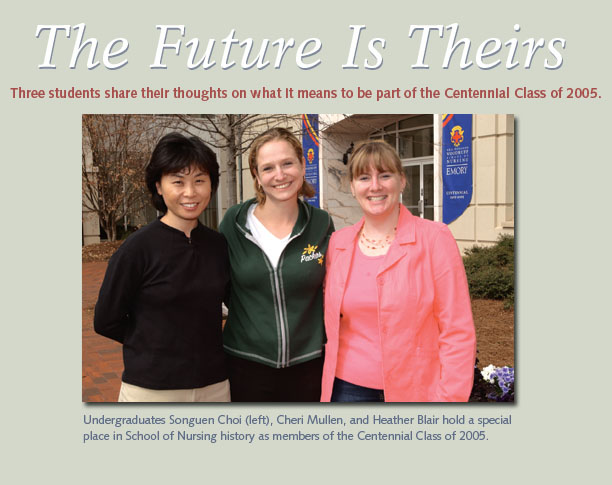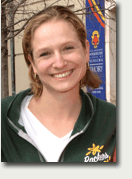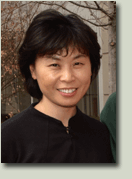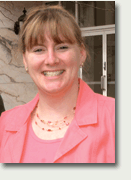















|
 |
 |

  mory
University’s Nell Hodgson Woodruff School of Nursing has come
a long way since its founding in 1905, but the school’s undergraduate
class of 2005 remains devoted to humanity and the original nursing
principles. What has changed in the past century is the composition
of our student body, which has enriched our potential and promise
as nursing leaders. mory
University’s Nell Hodgson Woodruff School of Nursing has come
a long way since its founding in 1905, but the school’s undergraduate
class of 2005 remains devoted to humanity and the original nursing
principles. What has changed in the past century is the composition
of our student body, which has enriched our potential and promise
as nursing leaders.
Collectively, we represent a wide
variety of ethnicities and backgrounds. Members of the Centennial
Class are from Nigeria, South Korea, South Africa, and all across
the United States, representing Christianity, Islam, and Judaism.
Our average age is 27.3 years, ranging from 21 to 53. Many of us
already have a bachelor’s or associate’s degree in another
field.
We are mothers, fathers, fiancées,
wives, and even husbands. We are successful business professionals,
nutritionists, anthropologists, psychologists, pharmacy technicians,
legal assistants, human resource specialists, writers, singers,
dancers, musicians, and even registered nurses. We love animals,
running, yoga, and volunteering throughout Georgia. We are involved
in student nursing associations that help people, influence health
care policies, and focus on local, state, and international issues.
Regardless of how we arrived in the class, we are one of the most
diverse and dynamic groups of undergraduate students the School
of Nursing has ever seen.
Student diversity brings me back to
Emory for a second undergraduate degree and will keep me pursuing
an MSN at the nursing school this fall. Beyond that, commitment
to excellence, leadership, international responsibility, dedication
to research, and receptiveness to new approaches uniquely personify
the Centennial Class of 2005.
We are in the process of becoming
floor nurses, nurse managers, nursing researchers, public health
nurses, nurse practitioners, midwives, nurse educators, and more.
As Emory graduates, we will advocate health promotion and care for
people of all ages from a holistic and culturally sensitive perspective.
Chances are that you will meet us
somewhere in Atlanta or across the world. Get to know us—hopefully
not as a patient!
Cheri
Mullen is president of the undergraduate Class of 2005. She also
holds a bachelor’s degree in anthropology from Emory College.
Mullen practices and teaches yoga, which led to her interest in
healing the body through nursing. She plans to work on the cardiology
floor at Emory University Hospital and eventually become an adult
nurse practitioner focusing on spirituality and wellness.
|
 |
 |

  ee
dee dee, dee dee dee... “Mom, the timer’s going off,”
my middle child, Brigid, informs me.“Is it fish fillets again?”
my first one complains. “I like it,” the third one says
in my defense. I’m upstairs at my desk, with my Medical Surgical
Nursing book…. ee
dee dee, dee dee dee... “Mom, the timer’s going off,”
my middle child, Brigid, informs me.“Is it fish fillets again?”
my first one complains. “I like it,” the third one says
in my defense. I’m upstairs at my desk, with my Medical Surgical
Nursing book….
Studying nursing is more challenging
to me than it is for most people. For one, English is my second
language, which makes studying more difficult and very time consuming.
Also, my interest in nursing began at a later age than many others;
most of my classmates are about two decades younger than I am. This
is discouraging at times. However, I have a key chain that says,
“Nothing is impossible if you have a faith as small as mustard
seed.” Ms. Anne Koci gave it to me during my first semester.
She is now Dr. Koci. [She received her doctorate in nursing in 2004.]
I keep the key chain with me at all times and read it whenever I
feel I am beginning to lose faith. Dr. Koci is one of the many great
teachers in the Nell Hodgson Woodruff School of Nursing. They not
only create an excellent nursing program but also care for and encourage
all of the nursing students.
I am very grateful and proud to be
a part of the Centennial Class of 2005. This is the beginning of
a prospect I want to pursue for the rest of my life: taking care
of others, especially elderly people. I will be able to dedicate
myself to my community and my family. All of my experiences in nursing
school confirm that I am surrounded by good people. I have received
unforgettable support from my family, teachers, staff members, and
friends. It is genuinely worth it to study nursing and graduate
from Emory nursing school, even though the tuition is high, the
news of burnout among nurses is frightening, and school and clinical
[demands] sometime seem impossible. Nevertheless, I have faith that
I will get through this last semester and then all the years of
nursing that will follow. As one of my classmates once said, “The
future is bright for us!”
Songuen
Choi came to the United States from South Korea in 1988. When her
first child was born the following year, Choi was impressed by the
medical skills and emotional support of her labor and delivery nurse.
After graduating from the School of Nursing, she plans to work at
Emory University Hospital and eventually specialize in geriatrics.
|
 |
 |

  eing
a part of the Centennial Class at the School of Nursing means lots
of wonderful things. I have chosen a profession of caring that relies
on a wide body of knowledge and a large skill set that has a long
history. I am one in a long line of people who have chosen nursing
and Emory as the road to where they want to be. The vast experience
I now have is built on the many people who have gone before me,
and those coming in the future will hopefully have an enriched experience
because of what the Centennial Class of 2005 has contributed to
the Emory legacy. eing
a part of the Centennial Class at the School of Nursing means lots
of wonderful things. I have chosen a profession of caring that relies
on a wide body of knowledge and a large skill set that has a long
history. I am one in a long line of people who have chosen nursing
and Emory as the road to where they want to be. The vast experience
I now have is built on the many people who have gone before me,
and those coming in the future will hopefully have an enriched experience
because of what the Centennial Class of 2005 has contributed to
the Emory legacy.
I have learned far more than I ever
anticipated in terms of nursing knowledge and care, but I have had
many privileges beyond the hospital. I went with classmates to the
Bahamas to experience health care in a faith-based setting and to
engage in philosophical discussions that were much deeper than what
typically occurs in the confines of a classroom. I provided migrant
farm worker care in Moultrie, Georgia, and tried to answer tough
questions, such as how do we address health care needs in a population
where there are language barriers, transportation issues, cultural
differences, isolation, and poverty? Being a part of the Centennial
Class has meant wanting more than coming and going from the classroom
or the hospital. It has meant being interested in the world at large,
wondering how what we are learning daily fits globally, and being
aware of the endless possibilities for applying what we are learning.
When I began college nearly 10 years
ago, I was uncertain about what I wanted to do. I had always thought
I wanted to be a nurse, but after starting a few of the prerequisite
classes, I decided that it was too hard and beyond my abilities.
Now, as I find myself approaching the other side of a tough program,
I am proud to have found a spot among this Class of 2005 and to
be a part of a class that will soon enter the world as nurses. I
am proud to have accomplished a goal that was long ago forgotten.
At times, it still amazes me to be here.
As a part of the Centennial Class,
I anticipate that much will be expected from me. One of my favorite
quotes has always been, “To whom much is given, much is expected.”
I feel I have been given much and will be expected to return even
more. I am excited about the possibilities.
After graduation, Heather Blair plans to work
for Emory Healthcare. Down the road, she hopes to do nursing mission
work in Central or South America and eventually trasition to hospice
nursing.
|
 |
|
|
|